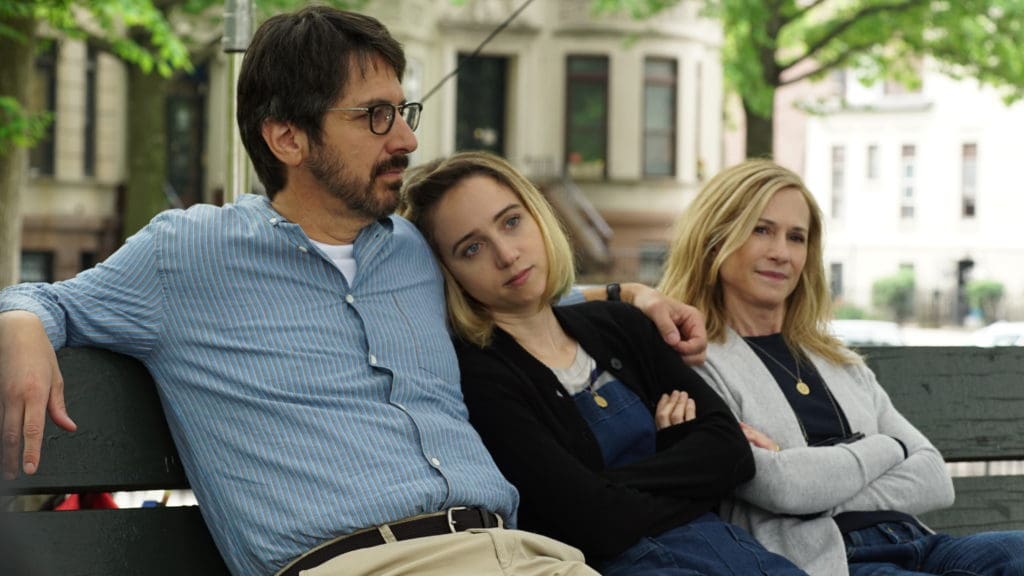
Life-threatening illness isn’t an obvious jumping off point for a romantic comedy, but that’s exactly what actor/comedian Kumail Nanjiani and writer Emily V. Gordon do with The Big Sick. Co-written by the real-life couple, the film tells the story of how they fell in love. It’s strange then, that the film version of the couple breaks up soon after they start seriously dating. When Kumail tells Emily that he can’t see a future between them because his family expects him to marry a Pakistani woman, the issue seems insurmountable — and then Emily ends up in the hospital in a medically-induced coma. What follows is an off-beat romance that constantly bucks against rom-com conventions.
While actress Zoe Kazan (more on her later) subs in for Gordon, Nanjiani plays himself. His character (and, as Gordon suggested in our interview with the cast, the actor himself) can be so dry, so passive that it’s somewhat difficult to root for him. Part of that is, admittedly, intentional. The character uses humor as a shield even before Emily gets sick, so, when he eventually experiences emotional reckoning late in the film, we understand exactly how unmoored he is.
However, clever as Nanjiani and Gordon’s script is, that moment (especially where and when it takes place) feels a little too conventional and it doesn’t quite land. Nanjiani plays the breakdown seriously, but we’re asked to laugh about the moment later in a way that clashes with what we’ve seen before.
To be clear, Nanjiani isn’t necessarily to blame. If anything, he plays the breakdown so well that it’s impossible to laugh at it later. The real issue is that seeing him express his worry and grief onstage doesn’t really feel like that much of a change. He spends the whole movie obfuscating his feelings with humor, this is just a more extreme version. What really makes the character appealing is the way he behaves in smaller moments. It’s in the way he consistently shows up at the hospital. It’s in the way he runs into Emily’s bedroom and hides her weed before her parents see it. It’s in his endless patience and willingness when he has to listen to said parents. Nanjiani may be the male lead, but he’s nothing if not a giving actor and his passive stability is precisely what allows the other actors to really shine.
Though Saturday Night Live alum Aidy Bryant and a smattering of other comedians keep the jokes coming, Nanjiani’s most consistent scene partners are Emily’s parents, played by Ray Romano and Holly Hunter. Romano starred on Everybody Loves Raymond for nearly a decade, so he can be forgiven for the instances where his bumbling, unassuming dad act feels a little too sitcom-y. He fairs a little better in the dramatic moments, but he is no match for Hunter.
When we first meet Beth (Hunter), she seems like the typical over-protective mother that so often appears on film, but Hunter and the film quickly reveal that she is more than just an antagonist for Kumail. After some crushingly awkward scenes at the hospital, Emily’s parents accompany Kumail to one of his stand-up gigs and Beth nearly gets into a fistfight with a racist heckler. In part, the scene is meant to emphasize that Beth is expressing her worry for Emily through anger. More importantly, though, it’s meant show us and Kumail that even if Beth may not like him for breaking Emily’s heart, she’s still a good person. She’s not going to let some “frat boy in a Hawaiian shirt” hurl racial slurs at a guy who’s just trying to tell some jokes.
Kumail’s parents (Anupam Kher and Zenobia Shroff) are treated with equal complexity. Though they function largely as obstacles in his relationship with Emily, the film also doesn’t dismiss their perspective outright. Yes, they want their children to benefit from the American dream, but they also don’t want them to abandon tradition and culture in the process.
However, perhaps the film’s most important example of empathy are the scenes Emily and Kumail share after she wakes up. The biggest downside to the film’s central conceit is that it forces Kazan to spend most of the film pretending to be unconscious. After spending so much of the film with Kumail, it can be easy to forget that while he’s been experiencing all this change, Emily has been asleep. The audience wants her to take him back and it would be easy to dislike Emily for refusing, but Kazan makes us remember and sympathize with the hurt that’s still so clear in her character’s mind. She is not just some manic pixie dream girl who gets sick so Kumail can be a better man. It’s a powerful reminder of the character’s agency and if we didn’t know that the real-life Emily and Kumail ended up together, it would be an unexpected and melancholy end to an already-surprising romantic comedy.
Given that, it’s hard to say whether The Big Sick is less powerful if you know the true story behind it. Granted, knowing that everything eventually works out robs the movie of some of its drama, but it also makes the whole story more romantic. Relationships are always hard and while something like an illness can provide clarity, it’s not always easy to make the right decisions. Perhaps that’s what makes this movie so affecting, that two people can make so many mistakes and still find a happy ending.

